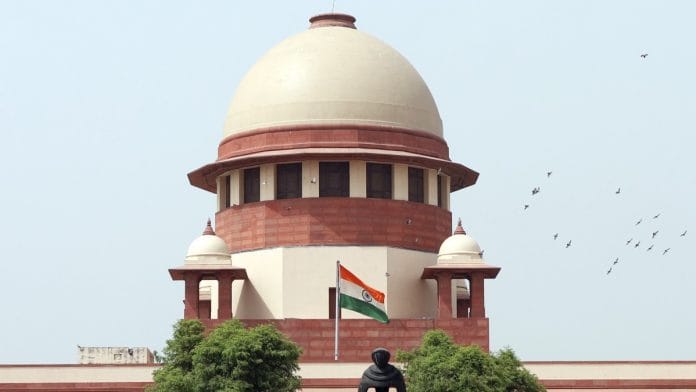New Delhi: Can a student insist on exercising his or her “religious right” in an educational institution where certain norms must be followed? That’s what the Supreme Court wanted to know Monday as it began hearing a batch of petitions on the hijab row that rocked Karnataka in January.
“You may have a religious right, but can you take that right within an educational institution where a uniform is prescribed? You may be entitled to wear the hijab or scarf, can you carry that right within an educational institution that prescribes uniform,” a bench of Justices Hemant Gupta and Sudhanshu Dhulia asked senior advocate Sanjay Hegde, who was representing one of the petitioners in the case.
“They [the Karnataka government] are not denying [them] the right to education,” the court said. “What they are saying as State is ‘come in uniform’.”
The Supreme Court, which was hearing a batch of petitions filed in March, also remarked that the Karnataka government’s order that extended liberty to the pre-university colleges to prescribe a uniform didn’t “violate” the right to education of students.
In its two-hour hearing Monday, the court posed a volley of questions at Hegde including whether a student could go to an institution in a ‘mini’ or ‘midi‘, and if a restaurant or a club could enforce a dress code.
Arguments also veered around whether there was a religious aspect to the use of ‘chunni’ or ‘dupatta’ and whether it was like the hijab — a point that the court emphatically denied.
In its brief submission, the Karnataka government claimed that its February order was issued only after receiving representations from various colleges. According to the state government, the colleges asked the court whether students could be allowed to wear “religious clothes”.
Since arguments were inconclusive, the court will now hear the case on 7 September.
Also Read: ‘Hijab row BJP bid to humiliate women’ — IS threatens violence to protect ‘honour of our sisters’
About constitutionality, pagdi and chunni
The hijab row broke out in January when the Government PU College in Udupi stopped six students from entering the college premises with their hijab — a headscarf that the petitioners claim Muslim women are mandated to wear.
After the six students sat in protest, students from several other colleges in Udupi began coming to college with saffron scarves.
As the row escalated, the Karnataka government issued a circular on 5 February banning religious symbols such as hijabs and saffron shawls in educational institutions. The order also said that uniforms must be worn in the institutions where such a policy exists.
The students then approached the Karnataka High Court. In their petition, the petitioners claim the February order empowered the college development committees (CDC) of government colleges to ban Muslim girls from wearing hijabs on campuses.
On 15 March, the Karnataka High Court ruled that hijab was not an essential part of Islam and that the requirement of a uniform can be categorised as a “reasonable restriction” on the fundamental right to free speech and expression (Article 19(1)(a)).
The court also held that the government power’s to issue an order was not invalid.
Even though the high court order was interim, the petitioners approached the apex court, which issued notice in the case on 29 August.
Before Hegde opened his arguments, senior advocate Rajeev Dhavan drew the contours of the case before the court. According to him, the case “delves into a constitutional issue” — that is, if “hijab is essential to Islam”. Dhavan was representing another petitioner in the top court.
To this, the court asked: “Can you say that you want to wear a religious thing in a government educational institution? Our Constitution says ours is a secular country and can you, in a secular country, say that religious clothing has to be worn in a government-run institution?”
Dhavan responded by talking about the practice of wearing turbans. “When there is a prescribed code, then can a turban be worn? Look around you milord, in court 2, there is a picture of a judge wearing a pagdi,” he said.
The court — particularly Justice Gupta — interjected to say the pagdi is “not religious”. “My grandfather used to wear it while practicing law. Don’t equate it with religion,” Justice Gupta said.
Hegde argued that the government order was contrary to the Karnataka Education Act. Taking a divergent stand from Dhavan, he asked the court to decide the issue on statutory grounds without entering into constitutional issues.
He questioned the exclusion of girl students on the ground of not following a uniform code. “How can we tell a grown woman that you cannot have control over your modesty,” he contended.
To this, Justice Gupta recalled how the court had, many years ago, objected to a woman advocate wearing jeans in court. “Technically, can the woman say ‘you cannot bar me from wearing jeans’? If you go to a golf course, there is a dress code. In some restaurants, you have a formal dress code; in some, you have casual,” the bench said.
Hegde, however, replied by saying the question of law in this case was access to education being conditional to a vulnerable section of the society. He argued the Karnataka Education Act doesn’t provide for such an exclusion. Can the state, therefore, through an executive order, create disabilities for girl students, he asked.
When Hegde went on to point out that ‘chunni’ was a part of school uniforms, the judges asked him not to compare it to a hijab. “Chunni is used to cover shoulders. Please don’t compare it to hijab. Sikh women wear it to cover their head in a gurudwara, but it is not part of their culture,” the judges said.
(Edited by Uttara Ramaswamy)
Also Read: The real issue in Karnataka hijab row is how secularism is defined wrongly – Nehru to Modi






